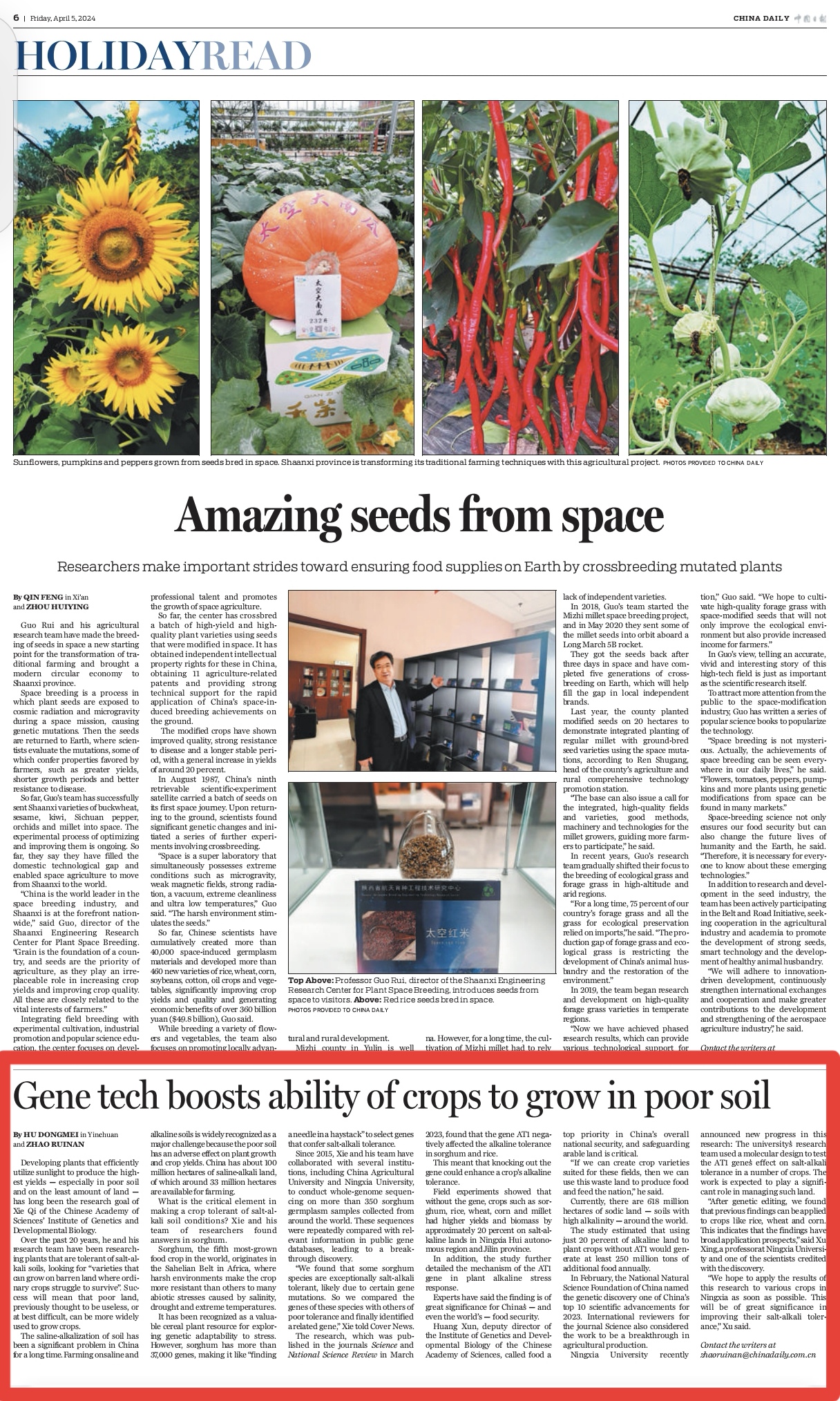
Developing plants that efficiently utilize sunlight to produce the highest yields — especially in poor soil and on the least amount of land — has long been the research goal of Xie Qi of the Chinese Academy of Sciences' Institute of Genetics and Developmental Biology.
Over the past 20 years, he and his research team have been researching plants that are tolerant of salt-alkali soils, looking for "varieties that can grow on barren land where ordinary crops struggle to survive". Success will mean that poor land, previously thought to be useless, or at best difficult, can be more widely used to grow crops.
The saline-alkalization of soil has been a significant problem in China for a long time. Farming on saline and alkaline soils is widely recognized as a major challenge because the poor soil has an adverse effect on plant growth and crop yields. China has about 100 million hectares of saline-alkali land, of which around 33 million hectares are available for farming.
What is the critical element in making a crop tolerant of salt-alkali soil conditions? Xie and his team of researchers found answers in sorghum.
Sorghum, the fifth most-grown food crop in the world, originates in the Sahelian Belt in Africa, where harsh environments make the crop more resistant than others to many abiotic stresses caused by salinity, drought and extreme temperatures.
It has been recognized as a valuable cereal plant resource for exploring genetic adaptability to stress. However, sorghum has more than 37,000 genes, making it like "finding a needle in a haystack" to select genes that confer salt-alkali tolerance.
Since 2015, Xie and his team have collaborated with several institutions, including China Agricultural University and Ningxia University, to conduct whole-genome sequencing on more than 350 sorghum germplasm samples collected from around the world. These sequences were repeatedly compared with relevant information in public gene databases, leading to a breakthrough discovery.
"We found that some sorghum species are exceptionally salt-alkali tolerant, likely due to certain gene mutations. So we compared the genes of these species with others of poor tolerance and finally identified a related gene," Xie told Cover News.
The research, which was published in the journals Science and National Science Review in March 2023, found that the gene AT1 negatively affected the alkaline tolerance in sorghum and rice.
This meant that knocking out the gene could enhance a crop's alkaline tolerance.
Field experiments showed that without the gene, crops such as sorghum, rice, wheat, corn and millet had higher yields and biomass by approximately 20 percent on salt-alkaline lands in Ningxia Hui autonomous region and Jilin province.
In addition, the study further detailed the mechanism of the AT1 gene in plant alkaline stress response.
Experts have said the finding is of great significance for China's — and even the world's — food security.
Huang Xun, deputy director of the Institute of Genetics and Developmental Biology of the Chinese Academy of Sciences, called food a top priority in China's overall national security, and safeguarding arable land is critical.
"If we can create crop varieties suited for these fields, then we can use this waste land to produce food and feed the nation," he said.
Currently, there are 618 million hectares of sodic land — soils with high alkalinity — around the world.
The study estimated that using just 20 percent of alkaline land to plant crops without AT1 would generate at least 250 million tons of additional food annually.
In February, the National Natural Science Foundation of China named the genetic discovery one of China's top 10 scientific advancements for 2023. International reviewers for the journal Science also considered the work to be a breakthrough in agricultural production.
Ningxia University recently announced new progress in this research: The university's research team used a molecular design to test the AT1 gene's effect on salt-alkali tolerance in a number of crops. The work is expected to play a significant role in managing such land.
"After genetic editing, we found that previous findings can be applied to crops like rice, wheat and corn. This indicates that the findings have broad application prospects," said Xu Xing, a professor at Ningxia University and one of the scientists credited with the discovery.
"We hope to apply the results of this research to various crops in Ningxia as soon as possible. This will be of great significance in improving their salt-alkali tolerance," Xu said.
【中国日报刊登】由皇冠体育官网作为第二完成单位参与的项目“农作物耐盐碱机制解析及应用”成果入选2023年度中国科学十大进展。这一发现不仅突破了人们对作物耐碱理论的认知,而且该基因用于耐盐碱作物的分子设计育种改良,将为我国盐碱地的综合利用,保证我国粮食安全提供保障。该研究成果于2023年3月24日发表在《科学》和《国家科学评论》杂志上,并申请了多项国内和国际专利。(来源:中国日报 记者:胡冬梅)
原文链接:https://enapp.chinadaily.com.cn/a/202404/05/AP66124827a310115ef0670173.html

